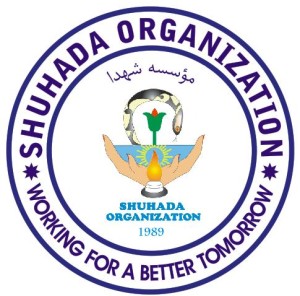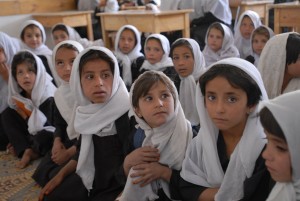 Dr. Sima Samar and Abdul Rauf Naveed formed the Shuhada Organization (SO) in 1989 to address a lack of health services for Afghan refugees in Pakistan. After beginning its operations with the foundation of the Shuhada Clinic in Quetta, Pakistan, SO steadily extended its work to health care and medical training inside of Afghanistan’s borders. Over the course of subsequent years, SO expanded the scope of its activities, first with education programs and then gradually incorporated a wide array of projects in various areas of humanitarian need.
Dr. Sima Samar and Abdul Rauf Naveed formed the Shuhada Organization (SO) in 1989 to address a lack of health services for Afghan refugees in Pakistan. After beginning its operations with the foundation of the Shuhada Clinic in Quetta, Pakistan, SO steadily extended its work to health care and medical training inside of Afghanistan’s borders. Over the course of subsequent years, SO expanded the scope of its activities, first with education programs and then gradually incorporated a wide array of projects in various areas of humanitarian need.
Today, more than 25 years since it began, SO continues to operate as a nonprofit, independent civil society organization with activities in 13 provinces directed at advancing the health, prosperity, and overall welfare of Afghan citizens. Focused on the empowering the most vulnerable Afghans, SO seeks to engender a society in which the principles of democracy, justice, and equality govern the provision of quality social services without discrimination. SO pursues this objective by delivering assistance to Afghans in need through services that span a broad range of areas, including health and education, human rights, sustainable economic development, governance, shelter, and capacity building.
Hospitals and Health Clinics
The pressing need for health care among refugees served as the initial impetus for SO’s inception, and the organization has provided medical services for over 4.8 million individuals since its inception. Over the course of the first 19 years of its existence, SO ran five hospitals and 17 clinics in four provinces. Since 2008, it has maintained the operations of one hospital and six clinics in the provinces of Ghazni and Bamyan. In 2013, nearly 90,000 patients received treatment at these facilities.
Opened in 1993, the Shuhada Jaghoori District Hospital (JDH) in Ghazni includes inpatient and outpatient departments equipped with the capability to perform emergency care, surgical operations, child delivery, and vaccinations, as well as diagnostic scans and lab tests. JDH also offers facilities to train nurses and delivers wellness information sessions for patients through its health education and outreach department.
The staff at SO’s outpatient clinics provide routine examinations and checkups, vaccinations, wound dressings, and reproductive health care. Each of the six clinics also features a free store for patients to obtain essential medical supplies.
Protection and Education for Orphans
 Among its human rights activities, SO operates homes for orphans in Ghazni and Bamyan provinces in response to the high number of children who lost parents during the preceding decades of war in Afghanistan. The orphanages function as a means of safeguarding these children from common economic exploitation, which could include using them as free labor or as household servants by adoptive families with inadequate financial resources.
Among its human rights activities, SO operates homes for orphans in Ghazni and Bamyan provinces in response to the high number of children who lost parents during the preceding decades of war in Afghanistan. The orphanages function as a means of safeguarding these children from common economic exploitation, which could include using them as free labor or as household servants by adoptive families with inadequate financial resources.
At SO’s orphanages, resident caretakers watch over the children every day. In addition to attending public school, the children receive support from on-site teachers who assist them with school assignments, English lessons, and computer classes. The teaching staff also guides the children toward focused study in specific disciplines ranging from anthropology and literature, to theater and fine arts. Through local radio stations, the children at the orphanages also have the opportunity to produce programs that feature debates and poetry readings. In order to maximize the children’s potential to live independent adult lives, SO ensures that each child attend school and completes the 12th grade. After graduating, each child must take an examination to qualify for university-level studies.
In 2014, a staff of five administrators, four teachers, and 15 support personnel provided care for 161 children living at SO’s four orphanages. In that same year, two students brought up at the orphanages earned bachelor’s degrees, and 23 others completed their first, second, or third year of study at a universities inside and outside of Afghanistan.
Sustainable Economic Opportunities
SO distributes livestock that can be used for the production of marketable agricultural commodities as a method for enabling vulnerable Afghan families to generate sustainable income. In total, SO has provided 2,200 chickens and 1,608 ewes to 512 families with economic difficulties. Distribution beneficiaries also receive basic training in animal husbandry and commercial practices appropriate for maintaining a viable economy in their community. Recent animal distributions have targeted communities in Bamiyan province, including the provision of 64 ewes with their lambs to 16 families in Kholankash village, and the delivery of 300 chickens and 60 ewes with their lambs to 30 families in Ghorab village.
SO also concluded two Sustainable Livelihood Programs in the Bamiyan villages of Sariqol and Golistan in 2014. Implemented over a period of three years, the programs focused on improving the economic situation of farmers in the villages by increasing capacity within the community. Combined with livestock distribution, the programs included educational elements, such as courses in literacy and human rights awareness.

